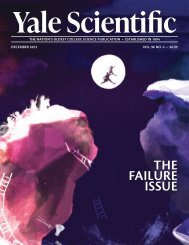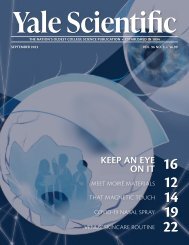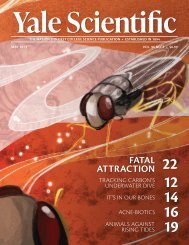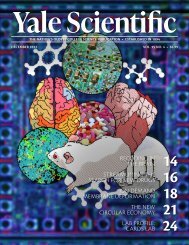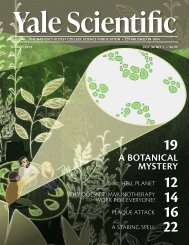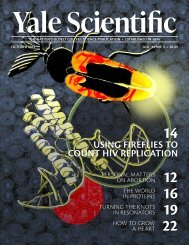YSM Issue 86.3
You also want an ePaper? Increase the reach of your titles
YUMPU automatically turns print PDFs into web optimized ePapers that Google loves.
Ailments of a Graying
Population
By William Zhang
Carol Orlando was 65 when her family
members noticed the first changes.
Her social graces began giving way to
a detached brusqueness; her eclectic interests,
to grinding repetition. Gradually, she lost
the ability to care for herself, and her family
assumed roles as her caregivers: washing and
feeding her, and ultimately assisting with all
aspects of her life. Frontotemporal dementia,
an ailment of aging, was taking its toll.
As she descended deeper and deeper into
this malaise, her speech devolved: “your dad
taking dog for walk,” her daughter Wendy
DeLucca recalled her mother casually stating,
entirely unaware of the missing words. Then,
seemingly overnight, Carol — known to be a
caring mother with endless love to spread and
an endless love for conversation — suddenly
stopped talking.
Of course, not everyone progresses like
Carol. She is just one example, the tip of the
iceberg. Aging occurs on a broad spectrum
and can unfold with a variety of symptoms
and other age-related complications, such
as cancer or cardiovascular disease. Diseases
such as cancer, dementia, and cardiovascular
condititions are not developed exclusively as
symptoms of aging, but they do, in many cases,
have far higher rates of occurence among the
elderly. Even without these diseases, aging in
itself can be a taxing process. The vigor of
youth fades away to be replaced by a slower
pace of life, sore joints, deteriorating vision,
and the accompanying loss of touch with the
prevailing culture.
And while these natural changes may be
pressing enough, the mental inertia of dementia
— or the wear and tear of other age-associated
diseases — exponentially compounds
these challenges and exacerbates the difficulty
of the journey for the elderly. Insidiously, these
complications envelop individuals in a state of
spiraling impairment, as DeLucca can testify
to, gradually snuffing out their very essence.
So what can we do? For decades, researchers
have vigorously pursued avenues for the treatment
and prevention of age-related diseases,
yet solutions are still elusive. Recent investigations
run the gamut, from studies of neuronal
function and genome sequencing of centenarians
to examining the relationship between
diet and aging. “If we could find cures [for
Alzheimer’s and other aging-related diseases],
it would solve all of these problems,” Maria
Tomasetti, South Central Regional Director
of the Alzheimer’s Association, Connecticut
Chapter, explains, “so everyone is searching
for them feverishly.”
Though medical answers may be far in the
future, public health research on aging is concurrently
progressing. This work is carving out
solutions to address arguably more immediate
and equally important concerns of improving
quality of life for the elderly, especially while
the biological mechanisms of disease are still
being unveiled. Recent research in this field
points to gaps in our treatment of the elderly
and of age-related illnesses and challenges the
very underpinnings of how we perceive aging.
Seeing the Forest Among the Trees
It is clear that aging and its associated diseases
impact the elderly, and thus public health
has naturally focused on treating patient conditions.
But Joan Monin, Assistant Professor
of Epidemiology at the Yale School of Public
Health, argues that there is a missing factor in
the equation. Behind every elderly individual
facing health complications is at least one other
person taking them to their appointments,
assisting with household chores, aiding them
through the difficulties: the caregivers.
Informal caregivers — those who are unpaid
and are often spouses or children — deliver
80 - 90 percent of personal and medical care
to the elderly with chronic illnesses. Approxi-
14 Yale Scientific Magazine | April 2013 www.yalescientific.org





